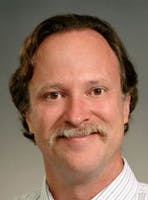Bio
Wendell Porter specializes in "green" buildings and heat and mass transfer. Porter began his career in private industry and a mechanical engineer focused on heating and cooling. But a restless intellect led Porter back to academia and to the University of Florida, where he earned his PhD in agricultural and biological engineering. Porter now works in sustainable construction practices and structures that conserve energy and resources. He teaches courses in these areas in the Agricultural Operations Management curriculum. His combination of ready wit and engineering precision makes him a popular and effective teacher.
Porter's research focuses on understanding construction in specialized applications not covered in standard construction programs. First, Porter is interested in Florida's unique environment. Most of the United States lies in a temperate climate zone, and many standard building practices are based on the the requirements of these areas. However, Florida's subtropical climate, with its heat and humidity, poses unique challenges and presents special opportunities. Second, Porter works on structures used in agricultural settings, which must be adapted to many specific environments and working requirements.
Florida construction styles were perfected over many generations of coping with the hot, humid climate, sandy soils, and high water tables. For example, Porter is currently engaged in a research project concerning crawl space ventilation. Standard building practices from northern areas would dictate sealing the space to exclude humidity. Floridians have learned over the years that the best idea is to ventilate these spaces and allow the daily patterns of humidity and wind to work together naturally to keep structures dry and prevent the growth of rotting molds. Understanding the daily cycles of heat and humidity is critical to designing effective buildings in Florida. Otherwise, improperly designed buildings will "fight" with the climate, require more complex and more expensive mechanical solutions, and will be predisposed to sick-building syndromes.
Regarding his work with resource-efficient housing, Porter describes the extensive work done in northern European countries on so-called "passive houses," in which construction materials and techniques result in a highly energy-efficient structure that has extremely low heat-loss and has a positive heat gain even in winter. Many of these homes do not even have central heating systems because the reuse of heat within the home and passive solar sources are sufficient to maintain a comfortable temperature year-round. These are designs for temperate climates that do not work in high humidity, but Porter adapts ideas from projects like the passive house and many other sources for application in Florida's climate.
Porter points out that the key to many energy efficiencies starts with how contractors are trained to build. Buyers and contractors have to start with an agreement that long-term savings are worth additional up-front costs. The long-term savings can be impressive, and the time it takes to recover and surpass the costs of energy-efficient construction need not be that long. The workshops that Porter conducts for builders train them in energy-efficient construction techniques and can give them a competitive advantage in attracting potential buyers. Of course, buyers have to be educated as well, and Porter has produced a number of publications to help homeowners understand many aspects of energy efficiency, including more efficient appliances, heating and cooling systems, windows, lighting, and more.
Resource-efficiency is also important in agriculture, and Porter's research becomes part of his teaching. In his agricultural construction classes, students are exposed to the latest in "green" construction materials and techniques. But Porter also likes to balance the latest information with the tried and true.
In Porter's construction classes, students learn about the types and uses of agricultural structures. The course covers building materials, tools, and techniques. They learn about building codes and management skills needed in maintaining a physical plant. Porter complements the intellectual learning experience with hands-on training. In the laboratory that goes with the course, students have weekly design challenges in which they practice the basics of all major building systems, including framing, plumbing, electrical, window selection and installation, and more. During the semester, the class will undertake a full-scale building project. Students work in teams and are supported by department staff who are expert in agricultural construction and maintenance.
Porter says that too often the "physical" side of education, which exploits the connection between hand, eye, and brain, is overlooked, and that it has many rewards. Many of Porter's students have never built anything, and as managers, it is important that they have an appreciation for the projects and workers they will oversee. Students working in teams develop camaraderie. They have the fulfillment of working with their hands and making something. The skills they learn in this lab will have many uses throughout their lives. Through these very tangible experiences, they build confidence.
While Porter believes that this kind of technical training is an essential counterpart to what students learn in class, he clarifies that this is not a trade school or a shop class. His emphasis is always on management and decision making. For example, he wants his students to have the hand skills of developing a sketch and filling it out with accurate dimensions, but they will not learn to draw a blueprint. What they need in this regard as managers is the ability to communicate their ideas clearly and correctly through drawings.
In all of this, students observe and practice the management of projects -- the central goal of their curriculum. Porter says that students learn all the basics of being a manager, such as how to eat "big doses of humble pie", how to manage a team rather than doing everything yourself, and how to treat people that work for you (and often have insight and skills that you do not) with the respect they deserve.











